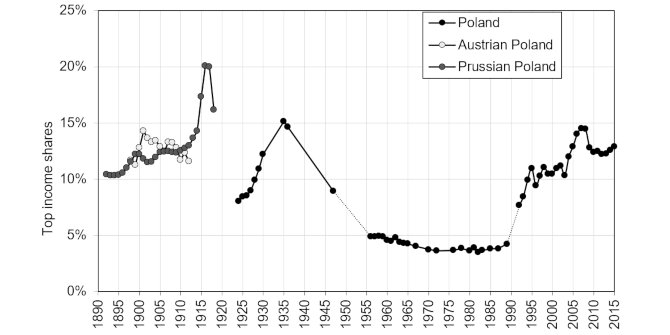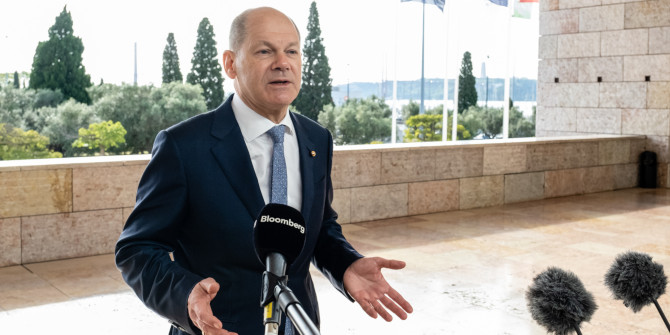Protests took place in a number of cities across the world following the inauguration of Donald Trump as US President. Laura Tedesco writes that Trump’s election undid many of the advances that had been achieved in promoting tolerance for minorities, and that responding to this new political climate will be far from straightforward – but that it is a moral imperative for progressive political movements to organise and react.
Since the 1980s, the concept of the politically correct has spread. Activists pushed for changes signalling that xenophobia, machismo and homophobia were socially unacceptable and should be politically condemned. New terms replaced disrespectful words and attitudes, which were increasingly ostracised. In the same way we learned that smoking kills, we were taught that to be different was not to be looked down upon, and that social inclusion enriched us all. The cost was to control our most primitive instincts: all this was a step away from the brutish state of nature.
This political correctness changed our social contract with communities that embraced an increasingly wide range of races, languages, religions, skills and sexual orientations. Globalisation has deepened diversity. Political correctness helped us accept this and to hide our most egotistical and exclusionary impulses. Nazism and apartheid stood as a reminder of what could happen if we failed to limit such urges. We adapted our language, employing new terms like Afro-American, Down’s syndrome, and LGBT community. As diversity spread, so we had to adopt new terminology, a process which still continues: e.g. with recent terms like the ‘burkini’, which became the subject of so much debate last summer.
But not everyone has embraced political correctness. Some have grudgingly accepted and resigned themselves to it so as not to face social stigma, but have never internalised the new norms, even if they have adopted the new terminology. Timur Kuran, economics and political science professor at Duke University called this ‘preference falsification’. In his 1995 book, Private Truths, Public Lies, he analysed the tendency for people to hide their true beliefs under social pressure. In order to be well mannered and agreeable many had to hide their true feelings.
Globalisation brought diversity home to the local neighbourhood. Many citizens began to feel their identities unravel. Terrorism has accentuated their fears. Does this explain the surprising election results we have seen recently? Do we no longer dare reveal who we voted for? And once someone laughs at the handicapped, disrespects women or insults migrants, many others may feel their politically incorrect feelings have become legitimised. Especially when that person becomes President of the United States.
Those who feel constrained by political correctness are tired of not being able to express themselves in response to the changing identities of their cities. Many feel threatened and alone in societies that are more and more alien to their traditions. When Trump broke with political correctness in his campaign, imitating a handicapped person, insulting Mexicans, expressing distrust of Muslims, denigrating women, he legitimised the politically incorrect, the law of the strongest.
Now the damage is done. The dam is burst. Those who were pretending to be something they were not, are now vindicated. Those that had achieved respect and inclusion now feel fear. Progressives, the tolerant, those who appreciate diversity are obliged to react. There was much struggle, blood and many ideals that helped overcome our basest instincts. The challenge for the progressive left is to accept that it cannot remain horrified and paralysed. Rather it must determine how to protest, and to defend what has been achieved.
A mobilised civil society can help defend tolerance and respect. Political correctness was not merely intellectual posturing, but is a necessity in eclectic societies, enriched by difference and contrast. Our ‘preference falsification’ made us more inclusive. We learned to limit our prejudices. Now the challenge is to participate: in civic organisations that defend minority rights, homosexuals and those that are different. And to continue to espouse the value of tolerance, while showing intolerance toward racism, machismo and misogyny. The aim is not to reinvent a utopia, but to defend what has already been attained. To go out onto the street to protect an inclusive, liberal, tolerant and democratic social contract.
Please read our comments policy before commenting.
Note: This article gives the views of the author, and not the position of EUROPP – European Politics and Policy, nor of the London School of Economics.
_________________________________
 Laura Tedesco – Saint Louis University/Madrid Campus
Laura Tedesco – Saint Louis University/Madrid Campus
Laura Tedesco is lecturer of Political Science and International Relations at Saint Louis University/Madrid.







Many people condemning Trump have called themselves “liberal”.
The Author here says:
“…..advances that had been achieved in promoting tolerance for minorities”
Then goes on to write:
“Activists pushed for changes signalling that xenophobia, machismo and homophobia were socially unacceptable and should be politically condemned.”
Superficially this may seem OK – but in practice a trend has arisen to find “racism” around every corner, to describe as “phobic” any sentiment that is even mildly questioning of a select group of behaviours, practices or choices.
Self-styled “liberals” never seem to get the irony of their raucous intolerance of the opinions or words of others.
So all sorts of easonable people have been “condemned” for alleged infractions of the PC “code”, e.g.:
* Questioning the number of migrants entering their country, impact on housing costs, public services and transport
* Conflating religion (a matter of choice) and race (which isn’t)
* Questioning whether Global Warming is a) bad and b) (if true) man-made
* Using “golly-like” to describe “big hair”
* Failing to enthuse about homosexuality (even neutrality/indifference isn’t enough)
* Questioning why the definition of “marriage” needs to be changed
The examples given of Trump exemplify the rush to find PC fault:
i) “imitating a handicapped person”. Surely Trump was focusing on an individual who has written many aggressive or critical articles, some of which (he argued) were plain wrong. His gestures could have applied to anyone floundetring in their own mistakes.
ii) “insulting Mexicans”. Trump was clearly focusing on illegal migrants – and a subset of these – yet his critics framed his remarks as about all Mexicans.
Apparently its OK for Green Day to refer to “American Idiots” !
iii) “expressing distrust of Muslims”.
But its OK to “express mistrust” of other approved (or rather disapprioved) groups – e.g. Republicans, Conservatives, Patriots/Nationalists, Global Warming sceptics – or (let’s cut the crap) anyone we can dub “far-right”
iv) “denigrating women”. Strange … I’ve heard Trump say “I love women” .. and of course his crass remark about pussy-grabbing was framed as if he actually did it – when an alterntaive interpretation was, he was describing how women in awe of celebrity give “permission” when perhaps they shouldn’t.
In summary, that self-prclaimed “liberal” Nick Clegg once said:
“No-one has a right NOT to be offended”.
There are more heinous ACTIONS that should be punished – not a poor choice of words.
Jules rightly makes the case for accepting the need for all in a free society to be able to express their views (provided expressing them is within the law), and also for those who disagree to be able to argue against those views, but that hiding behind a claim of being offended is not an option. I agree with him.
Are we perhaps two nations divided by a common language? However it may be understood in St Louis, “political correctness” is mostly used in the UK by perfectly normal, reasonable people as a term of derision. It denotes an intolerance of all views, however justifiable they may be (obviously not every single one is), that are thought by a self-selected and self-righteous group to be likely to offend some other minority (even though the group members are often themselves too mature to be offended by the supposed bigot they condemn), along with a patronising assumption by that group that they speak for all of that minority. Witness the foolish attempts to rename Christmas as “Winterval” and to discourage anyone from wishing others a “Happy Christmas”, just in case some Muslims (or whoever) might be upset – though it is clear that, apart from jihadists perhaps, they are not. Likewise the bans by some universities, of all places, preventing speakers expressing, perfectly legitimately, views that a section of the students dislike, but are apparently incapable of arguing against (as opposed to going on protest marches and sloganising). All too often, the “politically correct” group have a pseudo-liberal agenda of their own, and simply find “offence to [here name a minority]” a useful peg to hang their own intolerant ideas on.
I doubt if Ms Tedesco is likely to find a lot of support over here for her approach.
I thought Ms. Tedesco wrote coherently and honestly, but on the whole I agree with both commenters above. It may simply be something lost in the Spanish translation, but to an English speaker the concept of politically correct is self-evidently perverse and self-contradicting. Orwellian, in fact. Either politics is open, or it is totalitarian. Politically correct is, necessarily, totalitarian.